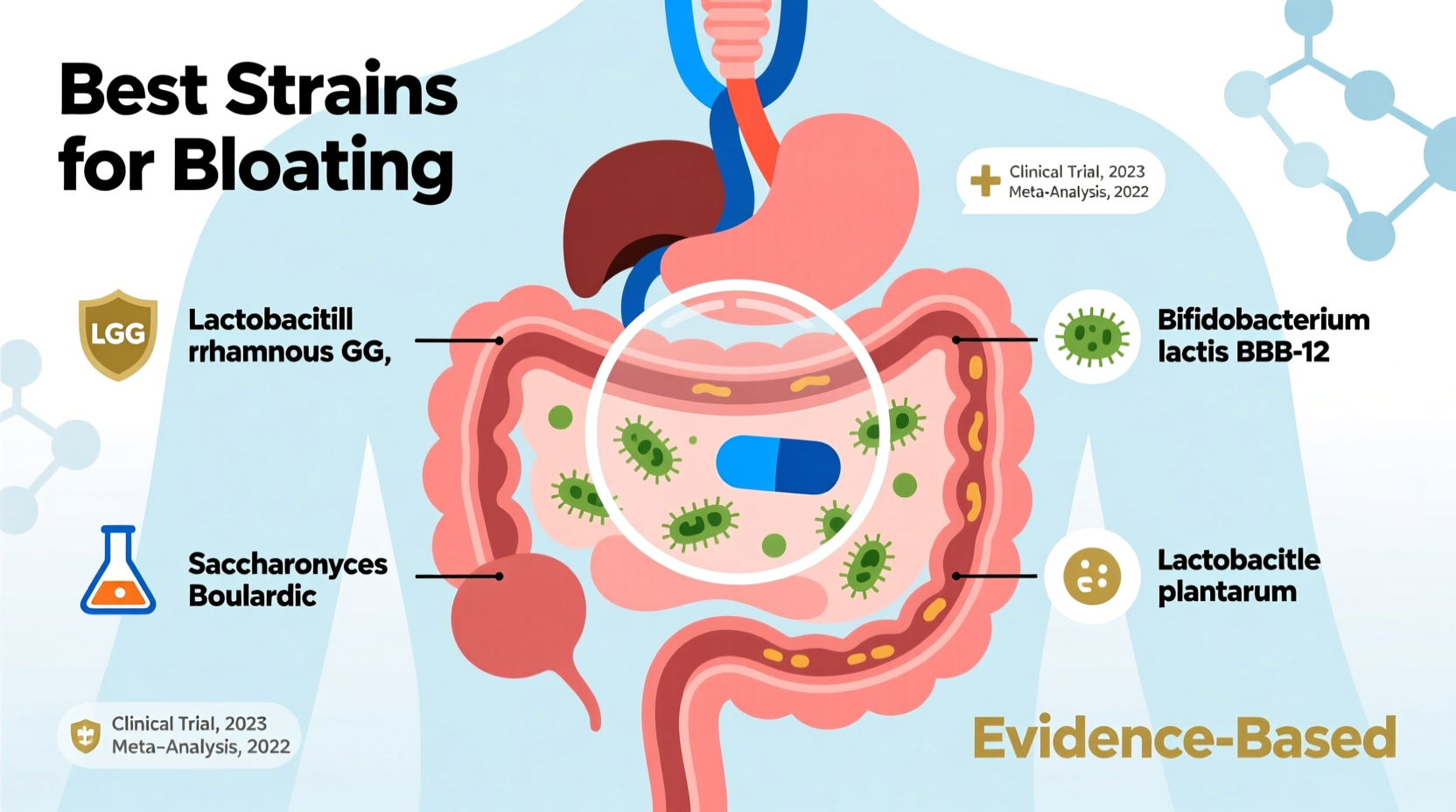Bloating is a common digestive complaint that affects millions of people worldwide. Characterized by a feeling of fullness, tightness, or swelling in the abdomen—often accompanied by gas, discomfort, or visible distension—it can significantly impact quality of life. While diet, stress, and gut motility play major roles, growing scientific evidence points to the gut microbiome as a key player. Probiotics, live microorganisms intended to confer health benefits when consumed, have emerged as a promising tool in managing bloating. But do they really work? And if so, which specific strains are backed by research?
This article dives into the clinical data, examines the mechanisms behind probiotic action on bloating, identifies the most effective strains, and offers practical guidance for selecting and using them appropriately.
How Probiotics Influence Digestive Health and Bloating

The human gut hosts trillions of bacteria, collectively known as the gut microbiota. A balanced microbiome supports digestion, immune function, and even mood regulation. When this balance is disrupted—a condition known as dysbiosis—symptoms like bloating, gas, and irregular bowel movements often follow.
Probiotics aim to restore microbial equilibrium. They may reduce bloating through several biological pathways:
- Modulating gut flora composition: Certain strains inhibit the growth of gas-producing bacteria while promoting beneficial species.
- Improving intestinal barrier function: Strengthening the gut lining reduces inflammation and prevents bacterial translocation, both linked to bloating.
- Enhancing gut motility: Some probiotics influence the enteric nervous system, helping regulate the speed at which food moves through the digestive tract.
- Reducing fermentation: By altering microbial metabolism, probiotics can decrease the production of hydrogen, methane, and other gases that cause distension.
- Lowering visceral sensitivity: In conditions like irritable bowel syndrome (IBS), probiotics may dampen the gut’s overreaction to normal stimuli.
“Probiotics aren’t a one-size-fits-all solution, but targeted strains show real promise in reducing functional bloating, especially in IBS patients.” — Dr. Laura Jenkins, Gastroenterology Researcher, King’s College London
Top Probiotic Strains Backed by Clinical Evidence
Not all probiotics are equal. The effectiveness of a probiotic depends heavily on the strain—not just the genus or species. Below is a breakdown of the most well-researched strains for bloating relief, supported by randomized controlled trials (RCTs) and meta-analyses.
| Strain | Key Benefits | Supporting Studies | Dose Range (CFU) |
|---|---|---|---|
| Bifidobacterium infantis 35624 | Reduces abdominal pain, bloating, and gas in IBS patients | Multiple RCTs including the ALLEGRO trial | 1x10⁹ per day |
| Lactobacillus acidophilus NCFM + Bifidobacterium lactis Bi-07 | Decreases overall gastrointestinal symptoms, including bloating | Double-blind study in American Journal of Gastroenterology | Each: 1x10⁹ |
| Lactobacillus plantarum 299v | Improves bloating in IBS and reduces hydrogen production | Scandinavian studies on functional GI disorders | 1–10x10⁹ |
| Streptococcus thermophilus TH-4 + L. acidophilus DDS-1 | Reduces postprandial bloating and gas in lactose-intolerant individuals | Clinical Nutrition, 2018 | Combined: 5x10⁹ |
| Saccharomyces boulardii CNCM I-745 | Helps rebalance microbiota after antibiotic use; reduces gas-related discomfort | Systematic reviews in Alimentary Pharmacology & Therapeutics | 250–500 mg daily |
Among these, Bifidobacterium infantis 35624 stands out for its consistent results in reducing bloating in IBS sufferers. One double-blind, placebo-controlled trial found that participants taking this strain reported a statistically significant improvement in bloating severity within four weeks compared to placebo.
When and How to Use Probiotics for Bloating: A Step-by-Step Guide
Using probiotics effectively requires more than just picking a bottle off the shelf. Timing, consistency, and selection matter. Follow this step-by-step approach for optimal results:
- Identify your bloating pattern: Is it constant, meal-related, or linked to stress? Keeping a symptom diary for two weeks helps pinpoint triggers and assess treatment response.
- Rule out underlying conditions: Persistent bloating could signal IBS, SIBO (small intestinal bacterial overgrowth), celiac disease, or hormonal imbalances. Consult a healthcare provider before starting long-term supplementation.
- Select a strain-specific product: Choose a probiotic containing one or more of the evidence-backed strains listed above. Avoid broad-spectrum blends without proven efficacy for bloating.
- Start low and slow: Begin with a lower dose for the first 3–5 days to minimize initial gas or discomfort, then increase to the recommended amount.
- Take consistently for at least 4 weeks: Most studies show measurable improvements after 2–4 weeks. Don’t discontinue too early.
- Monitor and reassess: After a month, evaluate changes in bloating frequency and severity. If no improvement, consider switching strains or consulting a gastroenterologist.
- Pair with dietary adjustments: Combine probiotics with reduced intake of fermentable carbohydrates (FODMAPs), adequate hydration, and mindful eating habits.
Common Pitfalls and What to Avoid
Many people fail to see benefits from probiotics due to avoidable mistakes. Here are key pitfalls to sidestep:
- Choosing products without strain specificity: “Lactobacillus” alone isn’t enough—the strain matters. Generic labels often indicate poor-quality supplements.
- Expecting immediate results: Probiotics modulate the microbiome gradually. Patience is essential.
- Taking them with hot beverages or acidic foods: Heat and stomach acid can kill live cultures. Take with water or shortly before a meal.
- Ignoring storage requirements: Some probiotics require refrigeration. Check the label—shelf-stable doesn’t mean heat-resistant.
- Using them during active SIBO: In some cases, probiotics may worsen bloating in SIBO patients, particularly those producing methane. Medical supervision is advised.
“I’ve seen patients worsen on probiotics because they were self-treating undiagnosed SIBO. Testing first can prevent unnecessary discomfort.” — Dr. Nadia Hasan, Integrative Gastroenterologist
Real-World Example: Managing IBS-Related Bloating
Sarah, a 34-year-old graphic designer, had struggled with chronic bloating and abdominal discomfort for years. Her symptoms flared after meals, particularly with dairy and onions, and she often felt visibly distended by evening. Diagnosed with IBS-C (constipation-predominant), she tried eliminating gluten and reducing caffeine with limited success.
After consulting a dietitian, Sarah began a low-FODMAP diet and started taking a probiotic containing Bifidobacterium infantis 35624 at 1 billion CFU daily. She kept a symptom journal and avoided known triggers. Within three weeks, her bloating decreased significantly. By week six, she reported only mild, occasional discomfort and no visible distension.
Her case highlights the importance of combining targeted probiotics with dietary management and personalized tracking—rather than relying on supplements alone.
Checklist: Choosing the Right Probiotic for Bloating
Use this checklist before purchasing any probiotic supplement:
- ✅ Includes at least one clinically studied strain for bloating (e.g., B. infantis 35624, L. plantarum 299v)
- ✅ Lists the full strain designation (genus, species, and strain code)
- ✅ Provides colony-forming units (CFUs) at expiration, not just at manufacture
- ✅ Contains an adequate dose (typically 1–10 billion CFUs/day for most strains)
- ✅ Stored properly (refrigerated if required) and has a clear expiration date
- ✅ Free from unnecessary fillers, allergens, or prebiotics if you’re sensitive (e.g., inulin may worsen gas)
- ✅ Manufactured by a reputable brand with third-party testing (look for NSF, USP, or ConsumerLab certification)
Frequently Asked Questions
Can probiotics make bloating worse?
Yes, in some cases. During the first few days, increased gas and bloating are common as the gut adjusts. This usually resolves within a week. However, if symptoms persist or worsen, it could indicate an underlying issue like SIBO or intolerance to certain strains or prebiotics in the formula.
How long does it take for probiotics to reduce bloating?
Most clinical trials report noticeable improvements within 2 to 4 weeks of daily use. However, individual responses vary. Consistency is key—many people benefit only after sustained use over several weeks.
Are probiotic-rich foods as effective as supplements?
Foods like yogurt, kefir, sauerkraut, and kimchi contain beneficial bacteria, but the strains and concentrations are often inconsistent and lower than therapeutic doses. While they support general gut health, they may not provide the targeted relief needed for chronic bloating. Supplements offer standardized, strain-specific dosing crucial for clinical effects.
Final Thoughts and Action Steps
Probiotics can indeed help with bloating—but only when used strategically. The key lies in selecting the right strain, following a consistent regimen, and understanding that they are part of a broader digestive wellness strategy. They are not magic pills, but rather tools grounded in microbiome science.
If bloating disrupts your daily life, start by identifying patterns and ruling out medical conditions. Then, consider a targeted probiotic like Bifidobacterium infantis 35624 or Lactobacillus plantarum 299v, taken daily for at least four weeks. Pair it with mindful eating, hydration, and possibly a low-FODMAP trial under professional guidance.









 浙公网安备
33010002000092号
浙公网安备
33010002000092号 浙B2-20120091-4
浙B2-20120091-4
Comments
No comments yet. Why don't you start the discussion?